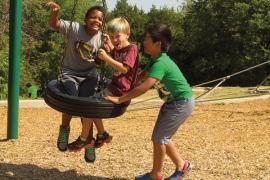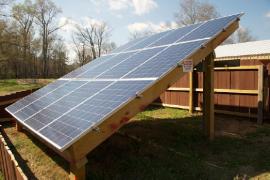What makes a great camp counselor? It’s not what you think.
The 2004 U.S. Olympic basketball team had just as many all-stars as the original Dream Team. They had superstars like Carmelo Anthony, Lebron James, Dwayne Wade, and Tim Duncan, and had arguably the best coach in basketball, Larry Brown. So why did they only get the bronze? Why did they have more losses in the 2004 Olympics than in all other Olympics combined?
Because basketball is just like camp in one critical way: It’s a team sport. Even if someone is great at working with campers, if he or she is hard to communicate with, bad at taking directions, or thinks it’s possible do it all alone, he or she won’t be a good camp counselor. No matter how good Lebron James is, he can’t win a championship on his own (see Cleveland Cavaliers 2003–2010). In fact, camp is such a “team sport” that having an all-star or two doesn’t guarantee a good experience for the campers (aka a championship). The goal should be a team of individual players who work so well together that they create something bigger than themselves, something that none of them could accomplish alone (see Detroit Pistons 2003–2004). OK, sorry, no more basketball references.
| The original Dream Team, comprised of basketball legends such as Michael Jordan, Larry Bird, Magic Johnson, and Patrick Ewing, went undefeated on their journey to a gold medal in the 1992 Olympics. |
You will spend most of your time during staff training learning essential counseling skills, camp routines, scheduling, programs, and activities. Of course, these things are necessary for a safe and fun program, so please pay close attention. But I’m telling you right now that you can be skilled at talking to a camper who is homesick, know exactly how to organize a fun evening activity, and run an amazing archery program, and still you wouldn’t necessarily be a great camp counselor. To reach greatness you have to be a fantastic team player.
What does that mean? You have to be fun and easy to be around. When someone has something to say (good or bad), you have to make it easy for them to say it to you. When you make a mistake or do something wrong, you have to take ownership for it and then make some changes so it doesn’t happen again. You have to be dependable, flexible, and patient. You have to have the same level of skills with the adults around you as you have with the campers.
There are a few ways you can create the team with whom you want to work. It requires initiative and leadership from you, and will result in dividends for you, your coworkers, and the campers who attend your camp.
#Talktoeachotherlikeyouareusingyourphone
We have to revamp one-on-one, in-person communication at camp to look more like how you connect with your friends at home. Since most of you can’t use your phone at camp (which is a good thing, trust me), we have to reinvent how to do the same thing in person.
If we use Facebook, Twitter, and texting as models of modern communication, we can go a long way to building an amazing team.
There are three things you do on Facebook that you should be using as models of communication with your teammates and campers in person.
- “Look at their profiles.” Don’t just get to know your teammates during the one team-building activity of staff orientation; get to know them all the time. During meals or down time, have conversations. Ask them about what they do outside of camp. Think about it like scrolling down their timeline.
- “Post and repost.” Let people know what you are doing and what you are thinking. This is particularly important when campers are at camp. Where are you going? What are you doing? What happened last period? What are you expecting next period? What did so-and-so tell you? It is the everyday happenings (statuses) of the group that will help keep all of your teammates in the know and allow you to function at the top of your game.
- “Interact with friends.” Whether you “like” something, comment on a post, invite someone to an event, or use another unique way to interact on Facebook, think about how to re-create that at camp. Pay attention to what others are doing with campers and programs. Can you acknowledge (like) it or even praise them for it? Talk with your teammates about how meals, drop off and pick up, transitioning to activities, or downtime is going (comment). Make sure you “invite them to events” such as staff meetings, informal meetings after the campers go to bed, program planning, social get-togethers, or anything else that is happening.
Twitter feeds create active check-in points throughout the day. Short snippets of what is going on are crucial for keeping everyone in the loop. This is one of the missing arts of great teams at camp. If you wait until the end of the day or the next staff meeting, you will probably miss something. A piece of info about a camper might be small and seem insignificant now, but it could help others on your team make sense of that camper’s behavior, reaction, or choice. Update your “counselor feed” about camper behaviors, activities, interactions, and what is going on with your teammates to engender actual teamwork and make strides toward the goals of your cabin, unit, or camp. Maybe even keep a piece of paper and pen in your pocket to keep notes and be able to quickly share them when you see your teammates.
Texting
Texting has become a main form of direct communication. It is now so ubiquitous that my mom texts me regularly (and she is not unique among her cohort of seventy-somethings). “Text” your teammates critical information or questions throughout the day. Seek them out and say what you need to say directly, listening carefully to their response, and then, if necessary, make time to check in again later. Keep it short. Overcommunicating something has the same effect as undercommunicating it: Things get lost and misunderstood.
Redefining how we communicate at camp will create great teams and positive environments. The question then becomes, “What’s important to talk about?” Well, what do people share via social media? It seems to fall into two basic categories, mundane or controversial.
@mundane
Sharing what you had for breakfast, the fact that you are heading to yoga, or some silly YouTube video of a cat are examples of the everyday fodder of social media. If we were to translate that into what we do at camp, it would mean talking about the daily plans and routines.
As a team member at camp, you have to actively develop, discuss, and facilitate plans and activities. There is a lot of assuming when it comes to the organization of camp, which is a set-up for miscommunication and a breakdown of the team. What is often obvious to one person is totally ridiculous to the next. There is no better example of this than meals at camp. Chances are you have some pretty unique traditions at camp when it comes to your meals. Watch the confusion of new staff or guests at your camp during the first meal or two when someone says the word “announcements” and everyone sings the announcement song flash-mob style (or whatever your traditions are).
Your routines don’t have to be complicated, just specific and explicit enough that you can outline them for each other and teach them to the campers. Think about how some of these things happen at your camp:
- Wake up / arrival
- Moving to and from activities
- Down time
- Meals
- Ending activities
- Bedtime/ departure
- Rest time
- All-camp activities
Make a basic plan and make sure you can answer the following questions clearly:
- Who is doing what and when (staff and campers)?
- Which staff member takes the lead?
- What is the goal? What do you want campers to know or do?
- What happens if the plan is messed up?
- How do you know that everyone else knows the plan?
You and your team should create these routines at the beginning and have an understanding about how they will help you all stay on the same page throughout the summer (Facebook). Check in and discuss your systems throughout the day (Twitter). Tweak plans along the way, and add to them or edit them if necessary (post and repost). Develop new routines that make sense, especially when there is a miscommunication or issue. Talk about it directly (text).
@controversial
These ideas of how and what to talk about are relatively easy when there isn’t any conflict or controversy. It is much harder when feelings are hurt or someone is not in tune with what your team is doing. A great team demands that members are willing to use direct, honest, and open styles of communication. The biggest challenge to this kind of communication is time. Most people sit on it when they feel upset or wronged. They stew. They talk to everyone else about it. They hint about it and then get more upset when the person doesn’t read their mind and immediately apologize.
When an issue arises in your team, whether it is between you and someone else, between others, or it is more of a whole- group issue, the first question you should ask is, “What is the shortest time frame in which we can deal with this?” Answer it honestly. Sometimes things have to wait because we don’t have the space away from campers for us all to meet. Other times (most times) we drag our feet because conflict is awkward, which tends to make everything worse.
There are four basic components for you to think about when you have to talk about something challenging.
- Think about who was involved. Try to include everyone when you have this conversation, as it is important for everyone to have a voice. When you talk to only some of the players, others will be less likely to buy in to any change of behavior (at best), or they will feel ganged up on and unfairly blamed (at worst).
- Consider what the facts are or what you think you know. I say it like that because facts can be subjective, and most people will have very different versions of the facts and different perspectives.
- Think about your strategy or solution. Don’t just bring up the challenges and issues; try to think through some solutions. Include some sort of change in behavior for yourself as a part of the solution. When you include that, it is easier for others to take responsibility as well.
- Take competent action. Commit to doing something about the issue. Typically, this involves a direct conversation or two and some combination of changing behavior, systems, or attitudes. Use fewer words. Don’t be the person that sends a text so long that you have to keep scrolling to read it. Try to be direct, honest, and responsible.
It’s not easy to communicate clearly and directly about issues and problems, but the best teams do.
If you work hard this summer at building your team, all the training you receive about working with campers and facilitating your camp program will be more effective. You’ll know that it worked because not only will the campers have an unbelievable time, it will also be fun and exhilarating for you. Your campers deserve the best of you, and working with an effective team will ensure this happens. For every all-star individual effort you see this summer, there is a whole team of people working to support it. It is up to you to create the 2014 Dream Team.
Scott Arizala is a trainer and consultant in summer camp. He is the director of Dragonfl y Forest, a camp for kids with serious illnesses, and Camp Kesem, a national organization for kids whose parents have cancer. He is also the author of S’more Than Camp. Contact the author at scott@thecampcounselor.com.
Originally published in the 2014 May/June Camping Magazine.
Photo courtesy of Camp Lenox, Lee, Massachusetts



